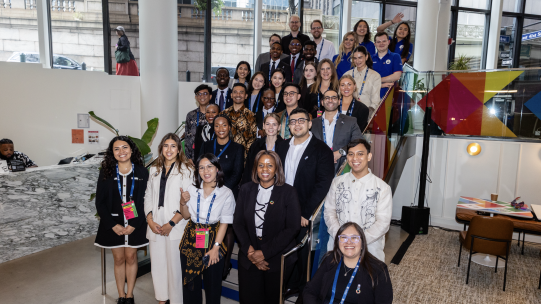The world convenes for climate at COP30
Read more

At a time when divides are widening, COP30 must be a turning point. The Paris Agreement— the global commitment to reduce warming to 1.5℃ to avoid the worst impacts from climate change— is working, but not fast enough.
We need to rebuild trust in working together through multilateralism and demonstrate that climate action and restoring our relationship with nature can unlock economic and social benefits for all.
At COP30 this year, the private sector came together in “a moment of truth” with governments, civil society, youth and Indigenous Peoples from around the world to identify a path forward that creates a future for people, planet and businesses to thrive.
Sustainable Investment: Scaling Solutions and Capital
The UN Global Compact and the Principles for Responsible Investment co-hosted Sustainable Investment: Scaling Solutions and Capital — bridging the momentum from São Paulo to Belém and uniting investors and businesses around one goal: turning sustainable finance into real-world impact.
The sustainable finance landscape is rapidly evolving, reshaping how companies and investors create value, manage risk and sustain growth. But fragmentation, short-term incentives and the underpricing of climate risk continue to hold us back.
To keep 1.5°C within reach, we need action on the $1.3 trillion annual climate finance roadmap launched at COP30 — action from the private sector as the core mobilizer of capital.
For that action to deliver real impact, it is critical for this money to reach the Global South, where investment can unlock resilience, growth and shared prosperity.
Insurance plays a vital role in this equation. It is a key catalyst for investment — especially in emerging and developing economies — helping to de-risk markets, protect livelihoods and strengthen long-term resilience.
At the same time, scaling blended finance and aligning corporate action on the ground with investor priorities will ensure capital flows where it is needed most.
With the SBTi Financial Institutions Net-Zero Standard, we now have a clear roadmap for the finance sector to turn ambition into action — driving real-economy change through transparency, policy and measurable targets.
With smarter investments, we can build a resilient, low-carbon and inclusive global economy.
The Renewable Energy Roundtable
The Renewable Energy Roundtable at COP30 brought together a select group of leaders from the global solar, wind, storage and clean energy sectors for a focused conversation on accelerating the energy transition. Convened by the UN Global Compact and joined by key UN partners, the meeting underscored that while renewable energy deployment is rising rapidly, progress is still far too slow to keep the 1.5°C goal within reach.
Building on the UN Secretary-General’s A Moment of Opportunity report, participants discussed how rising demand across AI, industry and transport is outpacing current supply, and how limited investment in emerging economies and chronic underfunding of grid infrastructure remain major barriers to scaling renewables at the speed required.
Leaders emphasized that public-private cooperation — particularly around policy reform, fossil fuel subsidy shifts, permitting, investment risk and market incentives — will be essential to unlock the next wave of renewable energy growth. The discussion highlighted the need for clearer enabling conditions, stronger infrastructure investment and more inclusive finance to ensure all regions can participate in and benefit from the global clean energy transition.
Caring for Climate
The 13th Annual High-Level Meeting of Caring for Climate offered a reminder that climate action and economic progress must go hand in hand. Co-hosted by the UN Global Compact, UN Environment Programme and UN Climate Change, the meeting brought together leaders from business, government, finance and civil society who reaffirmed that bold climate action is not a cost but a condition for long-term profitability and survival. Building on the momentum of the UN Secretary-General’s Climate Summit earlier this year, participants focused on how policy and finance solutions can unlock the power of corporate net-zero targets, transition plans and non-state actor initiatives to deliver on national climate commitments and keep the 1.5°C goal within reach.
Many highlighted that shifting subsidies away from fossil fuels, removing taxes on renewables, investing in infrastructure, simplifying permitting and improving data systems are essential to turn science-based targets and transition plans into real emissions cuts. Regional and sector-specific approaches — especially for high-emitting industries — will be critical to advancing Nationally Determined Contributions (NDCs) and strengthening public-private collaboration.
The economic case is clear. Continuing with business as usual will cost five times more than the investment needed to keep global warming within 1.5°C, while inaction already adds $500 billion in escalating damages each year. Yet the opportunities are equally significant: clean energy investment surpassed $2 trillion last year and a circular economy could unlock $4.5 trillion by 2030.
Extreme weather, supply chain disruptions, shifting regulations and growing investor scrutiny are already reshaping markets and impacting people around the world. Companies that move quickly to align with a net-zero, resilient economy are better positioned to attract investment, drive innovation and meet the needs of the future.
Turning the key: unlocking the next era of climate sustainability leadership
The UN Global Compact convened business leaders to reflect on findings from the 2025 UN Global Compact–Accenture CEO Study, the world’s largest research initiative on business sustainability. Drawing on insights from nearly 2,000 CEOs across 128 countries, the discussion underscored that the global business community sees sustainability not as an optional agenda but as a core driver of competitiveness and long-term value.
The Study revealed a decisive trend: 88 per cent of CEOs believe the business case for sustainability is stronger than ever and 99 per cent plan to maintain or increase their commitments despite growing political turbulence. Participants noted that while rhetoric may be softening in some contexts, real action continues — supported by the 92 per cent of companies that view strong global governance and coherent policy as essential to advancing sustainability and rebuilding trust.
Grounded in the scientific imperative to uphold the 1.5°C limit, leaders also reflected on the Secretary-General’s warning that a temporary overshoot is now difficult to avoid. Yet the message was clear: business has both the responsibility and the opportunity to shorten the overshoot by scaling science-based targets, accelerating renewable energy deployment and investing in resilience across operations and supply chains.
Read the full report here: https://info.unglobalcompact.org/ceo-study-2025
Path forward
While the work in each country varies, the transition away from fossil fuels remains central.
Throughout COP30, we consistently heard calls from businesses for more robust policies and enabling conditions, lower financing costs in emerging economies and the infrastructure needed to integrate renewables and phase out fossil fuels from the energy mix.
The UN Global Compact calls on businesses to:
• Advance an inclusive 1.5°C-aligned energy transition by scaling renewables and strengthening energy infrastructure to improve clean energy access for all
• Make adaptation a core business and finance priority so it is viewed as essential in protecting people, assets and supply chains
• Mobilize finance for a just and credible transition to meet global energy needs while building resilience
Now is the time to act. Businesses can and must play a vital role in meeting global climate goals.

